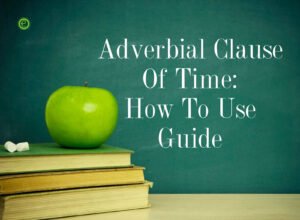With adverbial clauses or adverb clauses, you can provide additional information in a sentence. Just like adverbs, they are useful for the readers to know when, why, how someone did something.
As we know that most of the clauses in English grammar generally contain a subject, object, and verb. You can see that the sentences are inserted with subordinating conjunctions.
What are Adverbial Clauses of Time?
Adverbial clause of time is a subordinate clause used to shows when something happens. It uses subordinate conjunctions like when, before, after, as, by the time, while, until, as soon as, until, till, since, no sooner than, as long as etc.
We use Adverbs of time to introduce adverb clauses of time.
To understand it in a better way, you need to check out some examples of Adverbial Clauses.
- Maria helped all the students with their homework because they did not understand any of the assignments.
In the above example, you can see that the part “because….” is explaining why Maria helped all the students. So that part is considered as the adverbial clause. The adverbial clauses are also called the ‘Time Clause’ in English Grammar.
Note: An adverb clause can come before or after the main clause. When it comes to the beginning it is usually separated with a comma.
Example for Adverb Clauses of Time
Let’s begin to work with Adverbial Clauses Of Time and see some examples to understand how they are used.
1. When: The word ‘when’ is generally used to indicate ‘at the moment’ or ‘at the time’. You can also notice the difference in the tenses that are used. All these clauses are in relation to the clause which indicates that they are beginning with time. While you are using the word ‘when’ then make sure that it will take the form of simple past or simple present. Most of the dependent clauses change the tense in relation to the ‘when’ clause.
- Maria was talking on the phone when all her friends arrived at the party.
- She was walking down the lane when he was working on his programs.
- Meghna could wash the dishes when her baby was asleep.
- We can have lunch when you are done with your homework.
2. Before: The word ‘before’ is used to indicate the ‘before moment’. Make sure that you remember to use the word ‘before’ in a simple past or present.
- The food will be finished before Meghna arrives.
- She left for the train before I could call her.
3. After: The word ‘after’ will indicate the event which is happening ‘after’ something. The word is used to explain the future moments, past or past perfect.
- He will finish the homework after returning from the zoo.
- Mohana worked after I left the room.
- We will finish after he comes.
- She ate after I (had) left.
4. While, as: The words ‘while’ and ‘as’ are used in combination which will both work in the past continuous tense. It explains the ‘during that time’ moment in the sentence. It will indicate the action in progress.
- I began working while I was washing the dishes.
- While all the students were writing, the teacher started a new chapter.
5. By the time: It is basically used to express or convey the idea of an event that is completed before another. You must note that this word is used as an adverbial clause in the past perfect tense and future perfect tense. It will impact the main clause of the sentence.
- By the time they finished, she had cooked dinner.
- Students will have finished their homework by the time teachers arrive.
6. Until, till: With these adverbial clauses, you can express ‘up to that time’. It will be used in either a simple past or simple present. Let’s have a look at the examples.
- We should wait until she finished her cooking.
- Meghna will work until you finish yours.
Conclusion:
So, now you know about adverbs as well as adverbial clauses. With different types of adverbial clauses, you can form sentences that are meaningful and also explain the specific purpose behind it. The most essential point to note here is that these adverbial clauses are dependent clauses but they can always add meaning and extra information to the sentences.


